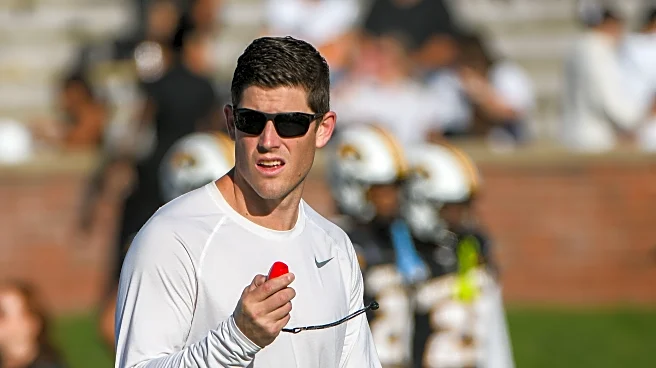When Eli Drinkwitz was hired as Mizzou’s head football coach in December 2019, he had this to say about the offense he planned to implement in Columbia:
“Our style of play on offense is a pro-tempo style. We’re going to base out of the no-huddle. We’re going to be quarterback driven. We’re going to have a dominant downhill running game, a vertical passing game and we’re going to execute under pressure.
”
No-huddle. Downhill running. Vertical passing. Quarterback-driven. That’s a pretty clear identity
for what you hope to build on one side of the ball.
Drinkwitz was hired with a reputation as an offensive whiz kid, a quarterback whisperer who had made much out of little in previous stops as an offensive coordinator and specialist coach. His style wasn’t exactly ground-breaking but his ability to implement and execute came with his marks. He insisted that he could serve as both head coach and OC at an SEC school. And… well, we saw how that went. Here’s how Mizzou ranked in SP+ over his first three years as Mizzou’s coach:
- 2020: 68th overall, 88th on offense
- 2021: 69th overall, 52nd on offense
- 2022: 40th overall, 74th on offense
Some growth overall, but his offenses fluctuated between mediocrity and below-average output. So in January 2023, with his seat getting warmer, Eli Drinkwitz went out and hired someone to take the coordinator responsibilities off his plate:
“At end of (last) season, we were ineffective on the offensive side of ball. I wasn’t giving us the best advantage. So (it was time to) turn over the play calling to someone else.”
Since Moore arrived in Columbia, Mizzou’s trajectory, both on offense and as a program, has skyrocketed. Here are the three years since Moore’s hiring in SP+:
- 2023: 10th overall, 13th on offense
- 2024: 19th overall, 24th on offense
- 2025: 20th overall, 34th on offense
Is there a slight dip in overall production over those three years? Sure. Was the 2023 season boosted by career years from Luther Burden III and Cody Schrader? Maybe. But you also have to give some of that credit to Moore, who revamped Mizzou’s offensive scheme and allowed Drinkwitz to take a more executive approach to the program, an approach he has parlayed into what will surely be a hefty pay raise at either Mizzou or some other program.
But sometimes, despite the shared successes two parties may have, there comes a time when a mutual separation might be best for everyone. And now might be that time for Mizzou and Moore.
This shouldn’t be read as an overly harsh criticism of Kirby, and it certainly shouldn’t be read as an indictment of the work he’s done in Columbia. By all accounts, Moore has been a success story. You can bet whatever money is in your bank account that Eli Drinkwitz, in whatever job interviews he’s currently taking, is touting his ability to scout coordinators and pointing to Moore as an example. Moore took the pieces that Drinkwitz gave him, both in personnel and scheme, and turned the Tigers’ offense into a hyper-efficient machine at its worst and a gashing, explosive running back factory at its best. This despite having no quarterbacks with the NFL staying power of a Chase Daniel, Blaine Gabbert or Drew Lock. No offense, Brady Cook, you know we love you.
It’s also hard to ignore, however, that Mizzou’s overall approach has gotten stale over time. The explosiveness of 2023 dried up quickly last season and never returned, even while Burden and Theo Wease, Jr., were still donning black and gold. And while Mizzou’s QBs have battled injuries over the better part of the last two seasons, neither Cook or Beau Pribula turned into the type of under-center talents under Moore’s tutelage that many SEC programs are regularly running out. Maybe Matt Zollers will be that guy, but that’s certainly no guarantee at this point. So, for the better part of two seasons, Mizzou’s offense has been heavily reliant on a zone run scheme that Drinkwitz has had in place for most of his time as Mizzou’s head coach. Moore’s additions in the passing game? They’re under heavy scrutiny.
Part of this comes with the natural cycles of the college football coaching carousel. This column is about Kirby Moore, but there’s no guarantee his boss will be back in Mizzou colors next fall either. The uncertainty around Drinkwitz’s status, not to mention the persistent rumors around Moore’s next gig after his wildly successful first year, have created a cycle all its own in Columbia. From the first year he arrived, Kirby Moore always felt like a stop-gap measure, even if he’s been in place for three years now.
Maybe, then, it makes sense for Moore and Mizzou to part ways amicably. A new voice on the headset could work wonders for both Pribula and Zollers, who could both return to Columbia next season with the security of Ahmad Hardy, Jamal Roberts or, hell, why not both? That’s one hell of a foundation to build on, and that’s before we get to the treasure trove of pass-catching talent the Tigers have in stock. Will the transfer portal provide some attrition? Undoubtedly. But here’s the way I see it: if Drinkwitz is back, he’s proven more than capable at supplementing a competitive roster through the portal. And if he’s not, Moore probably isn’t either.
But it’s not just Mizzou who could benefit from a parting of the ways. Moore has studied under Drinkwitz for three years now and has largely succeeded. Maybe it’s time he take the next step in his own career, whatever that may mean. There certainly don’t seem to be a shortage of schools that would bring him on, if you believe the rumors over the past two years. He could step into one of the many mid-major roles that will soon open up or scoop up an OC role at one of the power conference gigs that will soon be filling their lead roles. And if he has NFL ambitions? I’m sure Kellen wouldn’t mind having his brother around in Dallas. Regardless, it feels like Moore has done all he set out to do in Columbia. The lifespan of successful power conference coaching roles is short, and Moore’s appears to be reaching its end point.
All of this being said, there’s a world where Eli Drinkwitz signs a lucrative contract extension at Missouri and insists that Moore comes back for another round in Columbia. If that’s the case, Missouri fans shouldn’t fret. Moore has proven he can make Mizzou’s offense competitive, no matter what sort of roster he’s given. And another successful season would only cement the reputation he’s built for himself.
In the end, though, both Mizzou and Moore need to think about what’s best. And what’s best might be a shaking of hands, a pat on the back, and a hearty thanks for the good times they’ve had together.















